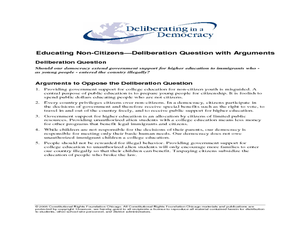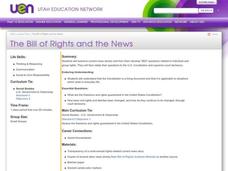Curated OER
Human Rights Arts Project and Research Paper
Students examine human rights abuses in thirty countries, specifically explore abuses in Dominican Republic's Trujillo regime, research one country with significant human rights abuses, use Preamble to U.S. Constitution as measure of...
Curated OER
Who Represents You?
Students investigate Congress and how individuals are represented in this Country. In this government instructional activity, students complete worksheets research government web sites to determine which senators and congressmen...
Curated OER
Black Kentuckians and the Civil War
Students demonstrate how the American Civil War affected black Kentuckians socially and politically. They identify and discuss the 13th Amendment to the U.S. Constitution, which forced the end of slavery in Kentucky months after the...
Curated OER
We the People Lesson 2
Students compare the Federalists and Anti-Federalists visions for the U.S. government. In this government lesson, students conduct research on Federalists and Anti-Federalists figures. Students use their findings to help them write...
Curated OER
History Biographies
Students explore the life and the contributions of five people from U.S. history in the five lessons of this unit. james Madison, Dolly Madison, Sequoyah, Harriet Tubman, and Clara Barton are presented to students for exploration and...
Curated OER
Chapter 2 – The US From 1789 to 1815
In this U.S. history worksheet, students read assigned textbook pages about the country from 1789-1815 and respond to 36 short answer questions.
National Constitution Center
Separation of Powers
Learners explore how the Constitution provides for separation of power and limited government, as evidenced by the three branches of government. They participate in role-playing situations, group discussions, and complete worksheets to...
Center for Civic Education
What Does Returning to Fundamental Principles Mean?
Looking for materials for your Constitution Day and Citizenship Day lessons? Then check out this packet of activities that not only gets your class members thinking critically about the fundamental principles at the heart of American...
Deliberating in a Democracy
Educating Non-Citizens
High schoolers distinguish between the privileges of being a U.S. Citizen and privileges that are forfeited if not a U.S. Citizen. For this history lesson, students analyze the rights of people in a democratic society through research,...
Judicial Learning Center
Civil Rights and Equal Protection
Almost every American is familiar with the Supreme Court case of Brown vs. Board of Education. Far fewer understand the constitutional reasoning or the wide-ranging consequences of the ruling in the field of criminology. The interesting...
State Bar of Texas
Roe v. Wade
At what point does the right of privacy end and the government begin? Scholars research rights under the Ninth Amendment to the Constitution. Using the 1973 Roe v. Wade Supreme Court case as a starting point, along with small group work...
Judicial Learning Center
Your 4th Amendment Rights
Americans love to learn about their rights, especially those that protect them from the government's power to invade their privacy. Young people are especially engaged by this topic. An informative lesson explores four Supreme Court...
C-SPAN
Choice Board: Expressed and Implied Powers
Article 1, Section 8 of the United States Constitution expressly lists powers given to Congress. Over the years, lawmakers have expanded the enumerated powers to include powers implied by the list. To better understand the significance...
Deliberating in a Democracy
Voting
Young scholars read about voting rights and compulsory voting in democracies. For this voting rights lesson plan, young scholars analyze the reasons for supporting and opposing compulsory voting and discuss whether compulsory voting is...
Curated OER
The Missouri Compromise of 1820
Students use a map of the Missouri Compromise to explain the geographical changes it brought to the U.S. and why the changes provoked a debate over the expansion of slavery in the U.S.
Curated OER
A Nation's Voice
Students research the Constitution and the War Powers Act in order to determine what the powers of the government are in times of conflict. They answer a series of questions then write a legal brief either supporting or condemning the...
Curated OER
Lesson 2: The Tired King
Middle schoolers are introduced to the three functions of government (legislative, judicial, and executive). They read and discuss a story about an overworked king who must handle all the tasks of government. Students give a description...
Curated OER
Readers Theatre: Presenting Historical Events Through Theatre
Students examine historical events. In this lesson on the US Constitution, students engage in a theatrical exploration of the Constitution and the Bill of Rights. They also engage in an extensive discussion, complete worksheets and draft...
Curated OER
4-H Citizenship Activity Page
In order to understand how our government works, students need to delve into the intricacies at both the local and federal level. Using this 20 question activity learners explore how government affects their daily life.
Curated OER
What Are Our Common Values?
Students make a poster. In this values instructional activity, students read the Preamble to the Constitution and discuss the core democratic values that are found there and in the Declaration of Independence. Students are each...
Curated OER
The Electoral Process
Learners explore the U.S. political system by completing several worksheets. In this government election lesson, students define and describe the two main political parties in detail to one another. Learners read a piece written by a...
Curated OER
The Bill of Rights and the News
Learners examine current news stories and from them develop "BIG" questions related to individual and group rights. They then relate their questions to the U.S. Constitution and supreme court decisions.
Curated OER
U.S. Government & Indian Nations
Young scholars explain the Constitutional basis of the Federal Indian relationship; summarize the Constitutional references to American Indians; and, evaluate the importance of the Northwest Ordinance of 1787.
Curated OER
Powerful Signatures
Students experience famous historical documents that were initiated and propelled by signatures such as Declaration of Independence, U.S. Constitution. They create a school amendment using the information gathered.

























